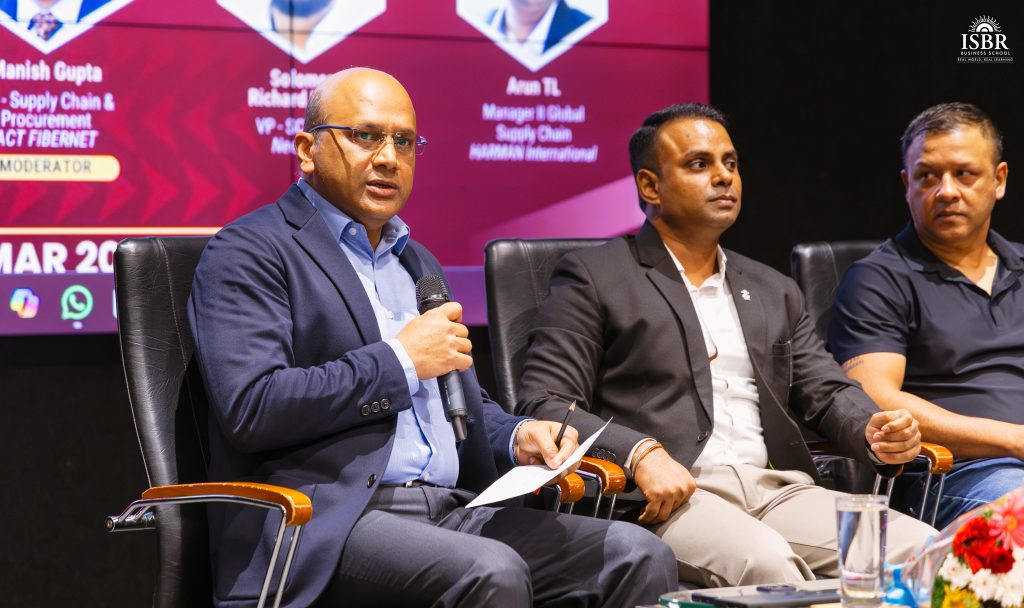ISBR Business School hosted an insightful panel discussion on “AI & Automation in Supply Chain: Challenges and Opportunities.” The event convened eminent industry leaders who provided thought-provoking perspectives on the transformative impact of AI in supply chain management. The distinguished panelists included:
- Major Chetan Gajula (Retd) – Director, Delhivery
- Colonel Razzaque Adil (Retd) – Senior Operations Manager, Amazon
- Manish Gupta – Vice President, Supply Chain & Procurement, ACT Fibernet
- Solomon Richard Harish – Vice President, Supply Chain Management & Customer Experience, Neeman’s
- Arun TL – Manager II, Global Supply Chain, Harman International


AI Disrupting the Supply Chain: Game-Changing Insights and Innovations
The session commenced with an overarching question to the panelists: What does AI mean to them, and how is it reshaping their industry?
This set the stage for an engaging discourse on AI’s pervasive influence across different facets of supply chain management.
- Solomon Richard Harish highlighted AI’s transformative role in e-commerce and quick commerce, particularly in enhancing demand forecasting, real-time inventory management, and personalized customer engagement. He reassured attendees that AI is not a threat to employment but rather an enabler of professional growth, urging industry professionals to adapt and evolve alongside technological advancements.
- Arun TL elaborated on AI’s role in manufacturing and production, emphasizing its significance in predictive maintenance, which helps prevent equipment failures. He underscored how AI contributes to improving production quality, reducing operational inefficiencies, and optimizing procurement processes, thereby fostering efficiency and cost-effectiveness.
- Major Chetan Gajula provided insights into AI’s impact on third-party logistics (3PL). He explained how AI-driven route optimization, real-time shipment tracking, and automated warehouse management are revolutionizing supply chain logistics. Additionally, he introduced emerging technologies such as blockchain and digital twins, emphasizing their potential in enhancing transparency, traceability, and efficiency within supply chain operations.
- Colonel Razzaque Adil addressed the risks associated with AI integration, including data security concerns, ethical implications, and workforce displacement. However, he concurred with Solomon Richard Harish’s perspective that AI should be viewed as an enabler rather than a disruptor. He emphasized the necessity of responsible AI adoption, advocating for human oversight to mitigate risks, ensure fairness, and uphold accountability in AI-driven decision-making.
A common theme throughout the discussion was the imperative need for workforce upskilling. The panelists emphasized that organizations must invest in training employees to work alongside AI systems, equipping them with competencies in data analytics, AI applications, and problem-solving. Additionally, the panel highlighted AI’s role in sustainability, particularly in resource optimization and energy efficiency.



Insights and Strategic Takeaways
- AI is revolutionizing supply chain management, spanning e-commerce, manufacturing, logistics, and risk mitigation.
- AI-driven advancements facilitate demand forecasting, predictive maintenance, and process optimization, leading to enhanced efficiency and cost reductions.
- The ethical and responsible deployment of AI, coupled with continuous workforce upskilling, is essential for organizations to harness AI’s full potential while addressing associated risks.
Final Thoughts: Embracing AI for a Smarter Supply Chain
The panel discussion provided a comprehensive and forward-looking perspective on AI’s role in supply chain transformation. While AI offers unparalleled opportunities, its successful adoption necessitates strategic implementation, ethical considerations, and human oversight. The valuable insights shared by the panelists equipped attendees with a deeper understanding of AI-driven innovations and the essential skills required to thrive in the evolving landscape of supply chain management.
About ISBR Business School: ISBR Business School, located in Bangalore, India, is a premier institution dedicated to providing world-class education in business and management. Accredited by the NBA and recognized by the Association of Indian Universities and the Ministry of HRD, Government of India, ISBR has consistently been ranked as a platinum institute by AICTE-CII. With a diverse student body, a strong emphasis on industry collaboration, and a curriculum designed to foster innovation and leadership, ISBR Business School is committed to shaping the business leaders of tomorrow. The school’s robust placement record and partnerships with top global companies underscore its commitment to excellence and career readiness for its students

